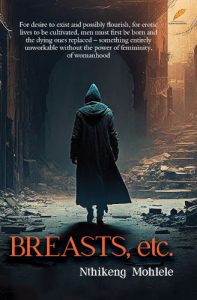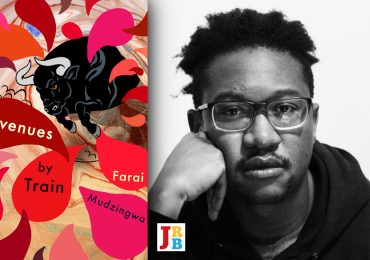The JRB presents an extract from Breasts, etc, the new novel from Nthikeng Mohlele.

Breasts, etc
Nthikeng Mohlele
Blank Page Books, 2023
A World Minus Women
Do not be fooled by the calm exterior. I am a man of many layers and complications. I straddle two parallel worlds: the first is my life as a photographer, the other is this eerie, bothersome, otherworldly consciousness that men will one day be punished for their transgressions in the world—that that punishment might be extreme, evolve into an existential crisis. Maybe punishment is not the right word or even notion; maybe what I am sensing is a winding down of the world as we know it, the impatience and irritation of time to eliminate what it no longer needs and to frustrate those it wishes to destroy. It is possible that my visions of a looming apocalypse are far from plausible or prophetic, logical or desirable. And yet, I cannot shake this nagging feeling that the emptying of the world of women will come to pass, even though I am unsure of the manner and timeframe of such an eventuality.
There are far worse anxieties that emanate from the forthcoming dystopia: that a baritone on a not-so-strong man like me is useless in that apocalyptic world when the women are gone, leaving behind both savagery and chaos. Would I have to be answerable to the Erwins who never made it as footballers, a home hand sweeping and dusting off slices of bread spoiled by layers of thick ash? How would I survive such a dystopia if my natural instincts—my connection to life—seem preordained to gravitate towards women and their mysteries, their thinking that the world does not think it needs the allure of their breasts and navels? How would it be to walk cosmopolitan streets in rebuilt and refurbished parts of cities for an evening at the theatre, a film premiere, a Mendelssohn orchestration or a fancy restaurant without a woman by my side? I am a lover of women, and know in advance that there are countless things I would terribly miss: how women hold and shake rainwater from umbrellas, the musical click of stilettos on concrete or tiled floors, the way light falls on their face during cosy, candle-lit dinners. I would yearn to see a woman battle to hold an errant dress against her body to counter forceful and involuntary disrobing by the wind, the glitter of colourful light that radiates from earrings of rare and expensive gemstones.
I would be pained by the absence of lipstick on mouths and smudged wine glasses, the powerful and character-building suffering of falling in love with female teachers. Tenor sonatas will soon become dreary and cumbersome without the sinking and rising voices of talented feminine vocalists with mesmerising falsettos; intrigue and wonder will all but die at receptions held at seven-star hotels and banquet halls; the same with midnight telephone acrobatics in bids to secure love and intercourse. I would miss how pantihose conceals the potency of otherwise bare feminine skin, miss the brilliance of women scholars and scientists. My heart would break at the inability to walk hand in hand with a lady, crave for a real mouth to kiss, and the way some women can kiss and giggle at the same time. I would miss the pangs of disappointment at following a gorgeous woman around a bookstore, only to be confronted by a wedding band of Wall Street money proportions. I would miss the patience of female psychologists who fix the world one madman at a time. I would miss it all, miss them all. The world would not be the same without the gossip mill of some women, their petty jealousies and catfights, their ever-evolving and varied insecurities. There would no longer be eye-catching and dramatic fashion statements at weddings or funerals, florists would eternally be emptied of their stock, and the rate of tunes belted out in showers would drop dramatically, if not completely cease. Yes, there would still be monasteries perhaps—but there would not be a single convent or nun in sight to remind the world of virtue and sacrifice. A lack would envelop me: that self-aware, discreet and unnatural self-admonishment to look away whenever a woman accidentally exposes herself in public. A lull would befall the land, absent of those informal and impromptu court proceedings women are able to institute at the drop of a hat, those thousand questions per minute to get to the bottom of whose panties or lipstick or strand of hair is in the fucking bathroom; chronological reconstructions of what men did with whom, how and for what reason, only to end up incriminating themselves in a prejudiced middle-of-the-night court proceeding without legal representation. Armageddon between some sisters, between mothers and daughters, would cease, but in its place there would be no spousal counselling as a break from crack-of-dawn courtroom dramas about this co-worker or that text message, no delayed compliment for a new hairstyle or the high treason of forgetting a birthday or anniversary or anything and everything.
There would be no one to calm or break up fights between men and thus prevent murders. The world would fall dead silent from the torture of nagging lovers and wives. I am terrified by the idea that there would no longer be girls in pinks and pigtails who would grow up and be compared with or turn out to be younger versions of Whitney Houston and Angela Bassett, Charlotte Maxeke or bell hooks. There would, as the din of silence descends to blanket the world, be no erect nipples in beds or swimming pools, only fat rodents with long reddish tails waiting for drunken men to doze off, to feed on their intoxicated carcasses.
Will Winnie miraculously emerge from among the ruins, from behind a veil of smoke, or suddenly appear in the rain to explain what that nude bath was all about those many years ago? It would be easy to place a ‘Back In 20 minutes’ sign and catch an escalator to the upper levels of Hyde Park Mall, to Woolworths, to ask Winnie this very question. But she would not be in a position to answer it because the Winnie of now is not the same as the Winnie post the Apocalypse; she would be baffled and believe I am losing my mind.
This is why the dystopia is another world I dread and muse about; because, though perhaps far-fetched and possibly nihilistic, it does not mean it cannot or couldn’t happen. The world would be bright and wonderful if women remain until a divinely designated Judgement Day, but what if my parallel universe is a warning, a premonition, a call to new consciousness for Erwins and Mohammeds and Obeds and millions of others like them? What then? Worse: What would become of Winnie or Olivia’s exemplary breasts some twenty to thirty years later? I can vouch for Esmeralda Abedienne, but she has not breastfed five children like Winnie, so any comparisons would be totally unrealistic and unfair.
~~~
- EAP member Nthikeng Mohlele was partly raised in Limpopo and Tembisa Township, and attended Wits University, where he obtained a BA in Dramatic Art, Publishing Studies and African Literature. He is the author of the critically acclaimed novels, The Scent of Bliss (2008), Small Things (2013), Rusty Bell 2014), Pleasure (2016), Michael K (2018) and Illumination (2019), and the collections of short stories The Discovery of Love (2021) and A Little Light (2023). His latest novel is Breasts, etc.
~~~
Publisher information
For desire to exist and possibly flourish, for erotic lives to be cultivated, men must first be born and the dying ones replaced—something entirely unworkable without the power of femininity, of womanhood.
A universe minus women can only mean extinctions of varying and catastrophic degrees. Erotic, perceptive and transcendental; Breasts, etc is a novel of double consciousness.
Portrait photographer and narrator James Baldwin oscillates between present day South Africa and the Frontier—an existential dystopia where women are inexplicably completely and permanently wiped from the world.
The novel is an exploration of and meditation on the existential strife and tragic comedy of the Frontier, a post-apocalyptic and desolate landscape that forms the backdrop to an examination of masculine vulnerabilities and wickedness in a world stripped of feminine presence and wisdom.





